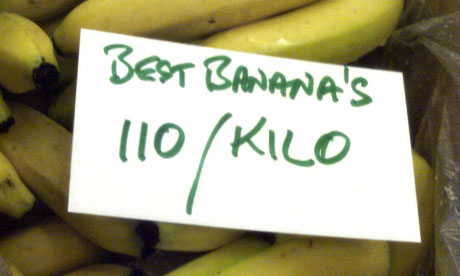Grammatical incorrectness and misplaced punctuation have long been a source of mirth in shopper marketing – hence the term grocer’s apostrophe. But in a world where people are using text speak in job applications and emoticons to profess undying love does good grammar matter anymore?
The problem is, for anyone who knows the rules, breaking them can say all kinds of things. And often not what the writer intended.
Confusion, distraction…
On a basic level, bad grammar or incorrect spelling or punctuation can give the wrong message entirely. So a sign saying ‘baby, carrots & sweetcorn 50% off’ may lead shoppers to think there are bargains to be had in the form of a small child rather than small vegetables. Whether or not you grasp the intended meaning, mistakes such as these make reading and understanding copy take longer. And who’s got time? By the time a shopper’s worked out what you’re actually trying to say they could have ticked several items off their list.
And even if someone does bother to stumble over less-than-perfect grammar, their attention’s been distracted away from the message and toward the errors. As John Lasseter, chief creative officer at Pixar and Disney Animation Studios says, “When you do your job right, and get something perfect, the audience won’t notice it. But if it’s not right they will notice it, popping out of the movie.” Get your grammar wrong and all shoppers will see is the blunder rather than the message.
…and perception
Worse still, they’ll judge your brand because of it. Who hasn’t made a judgement based on sloppy spelling, poor punctuation or grammatical gaffes? Such errors are perceived as having their roots in anything from a lack of intelligence to a lack of respect for the reader or a lack of care and attention to detail. And, as a brand, if you’re not worrying about getting your apostrophes in the right place, what else aren’t you worrying about?
Which can all combine to mean ineffective or even damaging marketing material, and a serious loss of potential sales.
Writing off the bottom line
Charles Duncombe, director of Just Say Please, believes poor spelling is responsible for millions of pounds of lost revenue. When a mistake was fixed on his retail site tightsplease.co.uk, revenue per visitor doubled. He believes it’s because misspellings “put off customers who could have concerns about a website’s credibility.”
This is corroborated by a survey by Disruptive Communications, which asked 1,003 UK consumers what they hate about brands they follow socially. Posts and updates that display poor spelling or grammar ranked above those seen as too salesy, too frequent or trying too hard to be funny. It irritated 42.5% of respondents – almost twice as many as the next most annoying behaviour. And it wasn’t just the older generation that was riled by such transgressions; it was the second most disliked behaviour among 18-24 year olds.
A study by Global Lingo cited even higher figures, with 59% of respondents saying they’d avoid doing business with a company that’s made obvious errors in the copy on its website. And Standing Dog Interactive’s study showed that 58% of respondents were either ‘somewhat’ or ‘very’ annoyed by copy errors, with one saying they’d leave without buying anything if they saw a typo.
Tesco has been on the receiving end of grammatical pedantry on more than one occasion. It changed its ‘10 items or less’ signs as a result of complaints that it should be ’10 items or fewer’. And earlier this year changed the double superlative ‘most tastiest’ on its orange juice cartons in response to a teenager’s petitioning.
Can bad grammar be good?
Clearly, there’s a strong case for getting it right when it comes to grammar, punctuation and spelling. But is there ever a reason to get it wrong?
Yes, I think so. Especially when it comes to creative copy. Effective writing is all about engaging people, getting across a message and inciting a desired response or action. And sometimes that’s best done by breaking the rules. Paul Whitehouse’s ‘Int milk brilliant?’ campaign, for example, wouldn’t have the same regional warmth with correct spelling. And Apple’s ‘Think different’ wouldn’t sound quite so inspirational if it called on us to ‘Think differently’.
I said above that grammatical errors can attract attention for the wrong reasons, but sometimes that’s the point of them – they attract attention. And they can help speed up communication. So ‘got milk?’ (what is it with milk adverts and rule-flouting?) is far more likely to stop people in their tracks, and get the message across faster, than ‘have you got milk?’.
A time and a place
It’s about knowing when to use correct grammar and when you can, and should, bend the rules. Which all comes down to knowing your audience and using a clearly defined tone of voice that aligns with your brand and your ambitions for its future.
Stephen Fry, who proclaims language is “the breath of God”, says it’s all about making language fit for purpose: “There’s no right or wrong language. Context, convention and circumstance are all.”
If your audience is made up of teenagers and you’re selling soft drinks they might love a grammatically incorrect headline (apart from the one who complained to Tesco about ‘most tastiest’). But if you’re selling single malt whisky to high-performing professionals a misplaced word might make them recoil.
Language can make or break a sale. So, whether you get your grammar, punctuation and spelling right or wrong, it’s important you do it deliberately and for the right reasons. And for that, you need to know your grammar.
*Any errors in this article are entirely deliberate.
